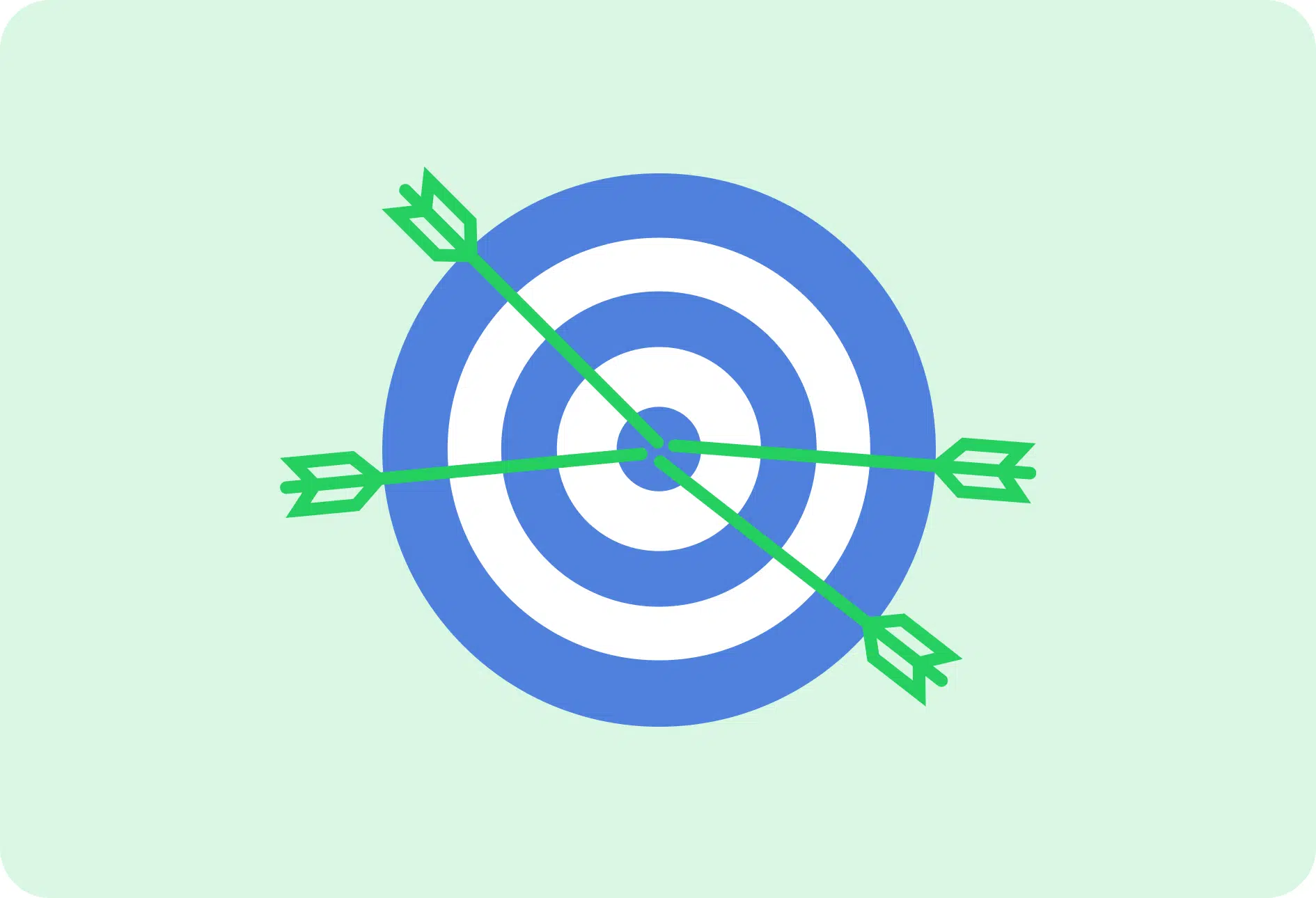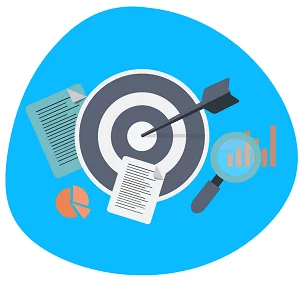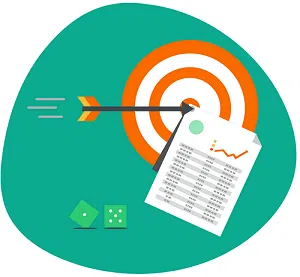Top 12 Examples of Career Goals for Self-Improvement
-
Kate Borucka
- February 28, 2020
- 7 min read

One of the most important job interview questions concerns career goals. Not without meaning. Your career goals say a lot about you and your plans for the future. They also set your professional trail and decide about the course of your career.
Let’s talk about career goals, their importance, and achievable career goals examples.
What Are Career Goals and Why Are They Important?
Career goals are like points on a map. They show you the way around the business world so you can get to the desired place. Often they may intertwine with personal goals and that’s good because it drives your growth.
A typical career goal sets you off in the right direction, especially at the beginning of your professional career. That’s why it’s one of the basic interview questions among all existing ones that are often created based on the interview questions template. It enables people to learn who you are and what your purpose is.
Career goal allows you to concentrate on a particular direction and create a professional development plan for yourself.
Also, career goals are important because they help you achieve the intended outcomes. They motivate, guide your career in the right direction, and help you become a better person.
Career development is not easy. You need to be ready for obstacles, sacrifices and hard work.
Remember, no pain no gain.
“Without labor, nothing prospers.”
~ Sophocles, philosopher
How to Set Career Goals?
So how to answer what are your career goals? Setting career goals may be challenging. You need to find a moment for yourself, hide from the world, and ask yourself “What do I want to achieve? Who do I want to be? What direction do I want my career to go?” These are difficult questions.
To find answers, you can use the SMART goals system to set career goals:
-
-
- S – Specific: Think about your strengths and weaknesses – it will help you determine, what you need to work on and what your career goals should look like. Don’t make a long to-do list – it will scare you off rather than motivate. Choose one or two goals you really want to strive for and work on them. Once you achieve them, you can set another goal.
- M – Measurable: You should be able to measure your progress, either in the form of metrics or any other scale that suits you
- A – Achievable: Make sure your career goals are realistic
- R – Realistic: Set goals that you have skills and resources to complete.
- T – Time-bound: Set a specific date – an upcoming deadline will motivate you to act
-
Additionally, to make it easier, you can divide your goals into two categories, long-term career goals, and short-term goals. You can also classify each goal into three different groups:
-
-
- Efficiency
- Personal development
- Education
-
If you feel like your time is slipping away and you are not any closer to your goals, you can try to use a time tracker to monitor where your time goes and stay productive.
👉 Check also our list of the best goal tracking apps.
Let’s take a look at career goals examples.
SHORT-TERM GOALS
Short-term goals usually don’t take that much time to achieve. Sometimes it may take a week, a month, or a year to two or three.
Also, these goals can help you achieve a long-term goal so make sure to rethink your decisions and create a strategic, detailed plan.
Take a look at the following examples of professional goals.
Improve Performance Metrics
This is the most popular example of a career goal. For many people, it is a top of the mountain and climbing it will let them see the full horizon of possibilities.
Performance metrics show how efficient you are at work. If they’re not satisfactory, you need to improve. Maybe you need to work on your current work strategy. Or the tools you use are not enough. It’s also possible that you have to learn more about your industry.
If you’re not able to measure your outcomes in numbers, you can think of a different way, depending on the business field you operate in. There is always a way!
Create a Personal Brand
This goal is particularly helpful for freelancers and solopreneurs. Creating a personal brand will help you reach out to more people.
Start by creating a website in the form of a portfolio that presents your skills and achievements. It will be a place where people can learn about you and your services.
It will give you more possibilities for finding a perfect job or getting that project you really want to work on.
Switching Jobs
If you’re unhappy with your current job or feel that you’re not developing skills, it’s time to switch jobs. Or maybe you don’t feel appreciated at the current company, your boss is rude and frustrated and teammates are not good at collaborating?
Any of these reasons are good to set a goal of changing jobs. Look for a job that would fulfill you and make you feel happy. For many people switching jobs is one of the best things that they have done for themselves. And it often opens doors for new possibilities and makes it easier to achieve the next goals. So, if you’re considering a job change, it’s crucial to prepare yourself for the transition. Utilizing a reputable resume builder can help you craft a compelling CV that highlights your strengths and experiences, increasing your chances of landing your desired position. Conducting an AI resume builder comparison should help you select the platform that best tailors resumes to your career objectives and highlights your skills effectively. And always refer to the best resume examples available online for the specific job role you’re applying for. This will help you ensure that your resume aligns perfectly with industry standards and stands out from the competition.
Networking
Networking is particularly helpful for freelancers and small businesses. If you feel that you need to improve your networking skills, participate in conferences, local meetups, and try to reach out to people that inspire you.
Don’t be afraid that you will fail, you won’t. And you may meet great people, make new friends who share your professional interests or even your future employer, you’ll never know till you try.
Earn a Certificate or a Professional Degree
Do you like to learn? That’s great because one of the goals that can empower you and boost your career is getting a certificate or professional degree. For example, if you’re in cloud computing, obtaining certifications like AZ-900 can enhance your skills and credibility. By utilizing resources like AZ-900 Exam Dumps, you can prepare effectively for certification exams and take your career to new heights. TApart from that, you can consider a professional degree. here are numerous postgraduate courses that let people develop, learn and improve skills. And it doesn’t matter how old you are. You can get a degree at any age. Also, it’s never too late to change your profession and start doing what you love. Some CFA courses offer online learning, so you can study from anywhere in the world. Whether you want to get a degree in business, management, finance, or any other field, there are CFA courses that can help you achieve your goals.
Setting and achieving this goal is particularly helpful if you’re planning to step up the hierarchical corporate ladder and work in the management.
Save Enough Money for Hobbies
Money can’t bring happiness but sometimes we need to pay for our hobbies so we can develop.
Save money for the instrument, you’ve always wanted to learn how to play guitar. Or that trip around the world. And the conference you’d love to participate in?
Hobbies make us happy. And happiness means better productivity. These smallish expenses can contribute to your success in achieving career goals and can teach you persistence.
LONG-TERM GOALS
Long-term career goals are more difficult to accomplish. Many people give up because it requires persistence, hard work, and consistency. The usual period for achieving long term goals takes from one to couple or more years, depending on the complexity and difficulty of the endeavor.
Here are the most common examples of long-term goals.
Start Your Business
If you’re tired of working under somebody’s command, starting a business is one of the best things you can do for yourself. Especially, if you have strong entrepreneurial skills and feel good in the role of a manager.
„Working for yourself gives you the possibility to lead your career in the direction you want to and be flexible. Additionally, you can hire the best talents that would help your business grow. Or if you prefer you can work solo.” says Jemma Clinton (Co-founder of Printer Wire).
It’s one of the most popular long-term goals that many people dream to achieve. All you need are the right resources, strategy, and willingness to work hard.
Become an Expert in Your Field
Everyone is good at something. And it doesn’t matter whether it’s cooking, writing or accounting. Whichever job you have, if you enjoy it, you can become an expert in your field.
The important thing is to always keep learning, improving, and take on the risks. Practice, make mistakes and be persistent. For example, if you’re into B2B eCommerce, you need to be up to date on B2B eCommerce trends and understand the intricacies of ecommerce fulfillment. This long-term goal requires self-discipline, patience, and time but it pays off in work-satisfaction, happiness, and numerous opportunities for interesting projects.
Work on Your Skills
Soft or hard, we’re not all born having the right set of those skills. And sometimes to get better we need to work on them. Maybe it’s communication, listening, or programming, writing, something that may help you get the job you want. You can sign up for a course, ask friends and family for help, participate in a volunteering program or even take up a new hobby.
It can help you become self-aware but at the same time be fun. No one said that improving your skillset has to be an agony.
Get a Promotion
Getting a promotion is an ambitious long-term goal for those who like challenges and don’t like being in one place for too long. However, to achieve this goal you need specialistic knowledge and have the right skills, especially if you want to reach a leadership position. It’s a good idea to talk about it with your manager, boss or colleagues as they can give you constructive advice and support.
Shift Careers
This goal may seem similar to the above-mentioned job switching but in fact, it’s not. While it is easy to change your job and start working for a different organization, changing careers is a 360-degree initiative that entirely transforms who you are and what you do.
You need to make sure that your other goals correspond with this one. Otherwise, you’ll find it difficult to pursue this goal.
Save Enough Money for Retirement
This is one of the most important long-term goals. Why is it a good career goal?
Because it can provide you with a safe, peaceful retirement without the need to work as an elderly person. Think about ways to invest your savings in such solutions as a Defined-Contribution (DC) plan or IRA, or ask your employer about possible fundings instead of bonuses. It’s a long term goal worth pursuing.
What Are Your Career Goals?
Career goals don’t have to be big. What matters is they should empower you and make you feel optimistic about your job and future. Whichever example of a career goal you choose, you will set on an exciting journey to self-development.
Do you have career goals examples that you want to achieve? Or maybe you already have specific job objectives that help you stay motivated? Let us know in the comments, we’d love to hear from you!





March 24, 2021 at 09:54
Really I have impressed on the way of your nice expressions and sharing this skill.
December 6, 2021 at 15:23
Good content. But I noticed that you’re missing the content for “R” for Relevant under your SMART approach bullets 🙂
January 5, 2022 at 18:41
Thanks, Jada, for your watchful eye! “R” is already on the bullet list 🙂